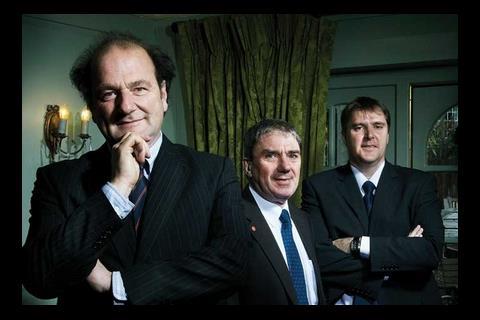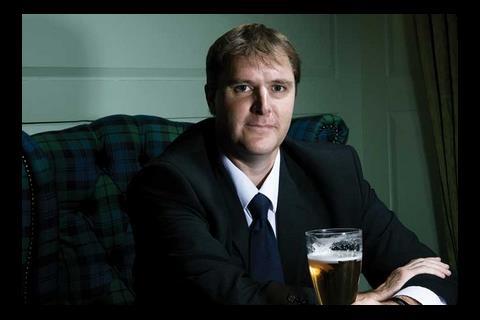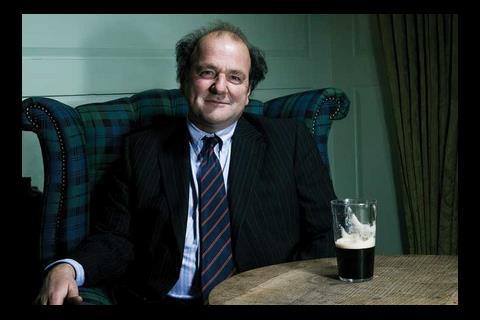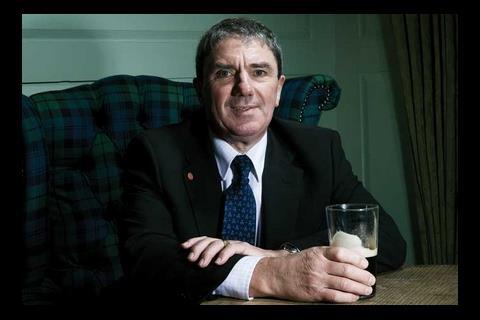In April this year, ∫⁄∂¥…Á«¯ gathered together three people who were running companies suffering from late payments and dwindling order books. We asked a panel of business experts to offer them advice on surviving the months ahead, including how to win work and maintain cash flow. Since then our three business owners have been hit with all sorts, from unpaid bills to a fine from the Office of Fair Trading. Roxane McMeeken reunited them to see how they are faring now
BACK FROM THE BRINK
DAVID KEEN
Runs Keen Electrics, a £480,000-turnover electrician in Fleet, Hampshire
Back in spring … The flow of jobs was drying up and Keen needed to find new customers desperately. He says: “We were living from day to day, never knowing whether we’d have work tomorrow or not.” On the plus side, “I had finally persuaded the bank to add £10,000 to my £40,000 overdraft, which was a real life saver as I was seeing payments coming in late and some customers not paying at all – I am looking at writing off up to £2,000 this year because of them.”
The experts said … Keen needed to bring his business partner up to speed with the company’s operations in preparation for his own retirement a few years hence. He was urged to sort out his website which our experts said looked “like something from the seventies” (if they’d had websites back then). He was also advised to start targeted marketing, including pitching for business with local trading estates.
What happened next “The postal strike was a blessing and a curse,” says Keen. With most of Keen’s invoices being paid by cheques sent by post, the strike hit the firm’s cash flow severely. The blessing part was that it prompted Keen to request payment by bank transfer instead. “We’re now printing our bank details on all our invoices and inviting customers to pay us by BACS. It has had an immediate effect. With BACS you know where your money is straight away, whereas with cheques we never quite knew where we stood.”
As for marketing, although Keen did not feel he had the money to upgrade his website, he did walk around a few local industrial sites pitching for work, and that has paid off. “Targeted marketing has been great for us – we got three extremely good clients out it.” One is particularly good, he says. The firm installs bathrooms with facilities for disabled people – “we thought they’d just want us to change light bulbs, but they’ve got us installing the electrics for special bathroom equipment. Each job has been worth between £200 and £500, which is fantastic for us.”
Keen was also able to get his staff to agree to waive the 7% pay rise over two years that had been agreed by his trade body, the Electrical Contractors’ Association, something that was worrying him back in spring. “We simply weren’t able to pass on the national wage rise agreed in January and we were able to come to a local agreement with our staff. We sat down with them and explained how things were and they were pretty understanding.” The agreement includes, for example, no overtime payment for jobs done outside normal working hours, but instead, staff get the time in lieu.
The increase in work means Keen’s firm, which nine months ago had six staff, including one apprentice and an office manager, has been able to promote the trainee and take on another trainee. The pipeline is more certain too: “We’re looking two or three weeks ahead now rather than a day”. Best of all, while Keen was expecting turnover this year to be down 10% on 2008, the firm is now on track to match last year’s £480,000, and profit should also equal last year’s £173,600.
Nonetheless, it’s been a tough year for Keen, who says the firm is almost at the limit of its £40,000 overdraft and “we’re still living on the edge at the moment”.
Outlook for 2010 Keen says: “I have taken the experts’ advice to start preparing for retirement by moving my business partner Kevin into my office – that way he’ll learn about the business side of things.”
Other plans have been postponed, however, while the company concentrates on the fight for survival. “The three-year agreement on Kevin’s car ran out a while ago and while we would normally have got him a new car, we’ve put that on hold.” The plan is to carry on with the targeted marketing strategy, however. “We’ll send out a few letters to exactly the right sort of people – maybe as few as 10 – and we’ll continue walking round trading estates.” He adds: “I think 2010 will continue to be extremely tough but then it’ll pick up towards the end of the year and I hope to maintain our current turnover and profit levels. It’s going to be tough but it’s not as bad as it was nine months ago and I think if we’re still here after that – unlike many of our competitors – we will make it out the other side of this recession.”
STEADY DOES IT
STEVEN GOSLING
Founder of DSG Quantity Surveyors, a £350,000-turnover company in Newbury, Berkshire, which was established almost three years ago
Back in spring … “It felt like the taps had been turned off, it was very quiet,” says Gosling. “Every time the phone rang we heard a job had been cancelled or put on hold. It was a worrying time.” The situation reached crisis point when Gosling was forced to consider giving himself a 50% pay cut. He says: “I was dreading to have to make redundancies or put people on a three-day week.”
The firm was working for the top 100 contractors and Gosling hoped to start doing jobs for architects too. He has a £15,000 overdraft facility which he was dipping into each month and then clearing immediately, but nevertheless, the business was under strain.
The experts said … They advised Gosling against expanding to a new office, as he was planning to at the time. They also said he should try to sell more services to his existing contractor clients, such as post-contract work. Finally, they warned him to keep a close eye on cash flow.
What happened next Gosling says that soon after ∫⁄∂¥…Á«¯ interviewed him work picked up. Since then he‚Äôs taken on two more staff ‚Äì a QS and a senior surveyor. The senior QS is winning and carrying out pre- and post-contract work for contractors, in line with our experts‚Äô advice, and he‚Äôs also marketing DSG to architects. The firm is building relationships with architects by offering CPD seminars on subjects such as the NEC3 contract. Gosling is hopeful this will yield results.
He also stuck to the experts’ view that he should continue to pay close attention to the books, and has continued doing a monthly balance sheet and profit and loss account, as well as holding monthly meetings with his accountant.
Against the experts’ advice, however, DSG has moved into a bigger, 1,200ft2 office. Gosling says the move to rented, serviced offices was justified by the extra staff and also the fact that the firm is beating his turnover expectations. It will turn over between £340,000 and £350,000 for the year to February 2010 and make £80-90,000 profit, against a projected turnover of £300,000.
Outlook for 2010 Gosling will keep a tight reign on cash flow. He says: “Our payment terms are 14 days but we don’t always get that. Sometimes it’s 30 but we are actually okay with that.” Gosling plans to chase late payments with regular phone calls and emails. “I’ll keep things friendly, I won’t send formal letters, for instance, but I will be persistent,” he says. He’ll also stick to dealing with large contractors, which he thinks are better payers and less likely to go bust. Although he wants to grow DSG at a controlled pace, Gosling is considering opening an office in Bristol. “We hope we’re through the worst of it,” he says.
LIFE AFTER THE FINE
DAVID CHAMBERS
Runs Lindum Group, an £80m+ contractor in the Midlands
Back in spring … Lindum was one the firms the Office of Fair Trading accused of cover pricing. Chambers was awaiting the conclusion of the OFT’s investigation and fearing that it could result in a fine. On the plus side, Chambers had not made a single one of the company’s 460 employees redundant and had even given them a 2.5% pay rise at Christmas. He said the firm was not suffering from late payments and had no debt.
But Lindum was feeling the effects of the recession, particularly the decline in commercial work and in private housebuilding, which accounts for 30% of Lindum‚Äôs business, as well as lower fees. Chambers says: ‚ÄúAt the time of the article in ∫⁄∂¥…Á«¯ we had the sense that the world was going to implode; I think March was actually the worst month of the recession.‚Äù
The experts said … They warned that redundancies might be necessary in the coming months and cautioned against chasing poorly paid work for the sake of turnover. They also thought Lindum should spruce up its website.
What happened next The OFT slapped a severe fine on Lindum of £496,017. This amounts to over one third of its projected £1.4m profit (excluding the fine) for 2009. Profit is down as it is, from £2.2m last year, and turnover is down to £81m from £87m in 2008.
Chambers is fuming about the fine, which he brands “a tax raising exercise”. He says: “We feel we had no fair trial: the OFT has not proved our guilt and we have not had a chance to defend ourselves.”
But he’s not joining the firms appealing against their fines, such as Kier: “We aren’t big enough to take on the OFT, we just have to live with the fine.” Lindum has three years to pay it off, which makes it slightly easier to cope with but Chambers fears reputational damage. “We know of at least one private sector client who did not choose us because we were on the OFT’s list.
In the community I also think people feel surprised and disappointed in us. I do think they are giving us the benefit of the doubt, though, and we recently won a Lincolnshire community award for completing a project for a local school for disabled children, which I think gives people a better idea of what we’re about.”
Aside from the fine, the business is bearing up.
It remains debt free, although it has an unused £1m overdraft facility just in case and its clients are still paying on time: “We chose the right clients”, says Chambers.
Back in spring, Lindum had 35 jobs on the go, “and we still have that number now, although some of the new jobs are on tighter margins, admittedly.” Net margins are down from 2-2.25% a year ago to 1-1.25%. “It means that work is even higher risk – we cannot afford to make mistakes or we lose money,” says Chambers. He’s taken on an extra estimator, partly on account of the need to scrutinise prices more closely.
Indeed, Lindum is still growing. It has added seven staff since March and plans to grow its satellite office in Peterborough, which turns over £12-15m. However, it did make one redundancy in its now nine-strong joinery business, which is suffering from declining demand. The housebuilding arm has done better than expected, selling 28 homes this year against projected sales of 20.
And Lindum has also invested in marketing, taking our expert’s tip and upgrading its website, which is now more modern and easier to navigate. This cost £6,000. “We’re trying not to cut back on marketing,” says Chambers. “We will still hold a party for our clients this year, for example.”
Outlook for 2010 Lindum’s workload has shifted from 60-40% in favour of public sector work versus private to 75% public now, which could cause problems if government spending is cut, as is widely expected. Chambers says: “We’re expecting all or some of the following: public sector spending cuts, tax increases wand increasing inflation – all of which will mean less construction work.” Chambers concludes: “All in all, 2009 was less bad than expected but worse is to come.”
He expects to make only a meagre profit of £500,000 next year.
Our experts were
Business adviser Ken Tracey, commercial adviser, Electrical Contractors Association
Marketing guru Neil Stanley, director, Altered States Marketing
Accountant Clive Lewis, head of medium sector issues, Institute of Chartered Accountants, England and Wales
Postscript
Portraits by Steve Schofield































No comments yet